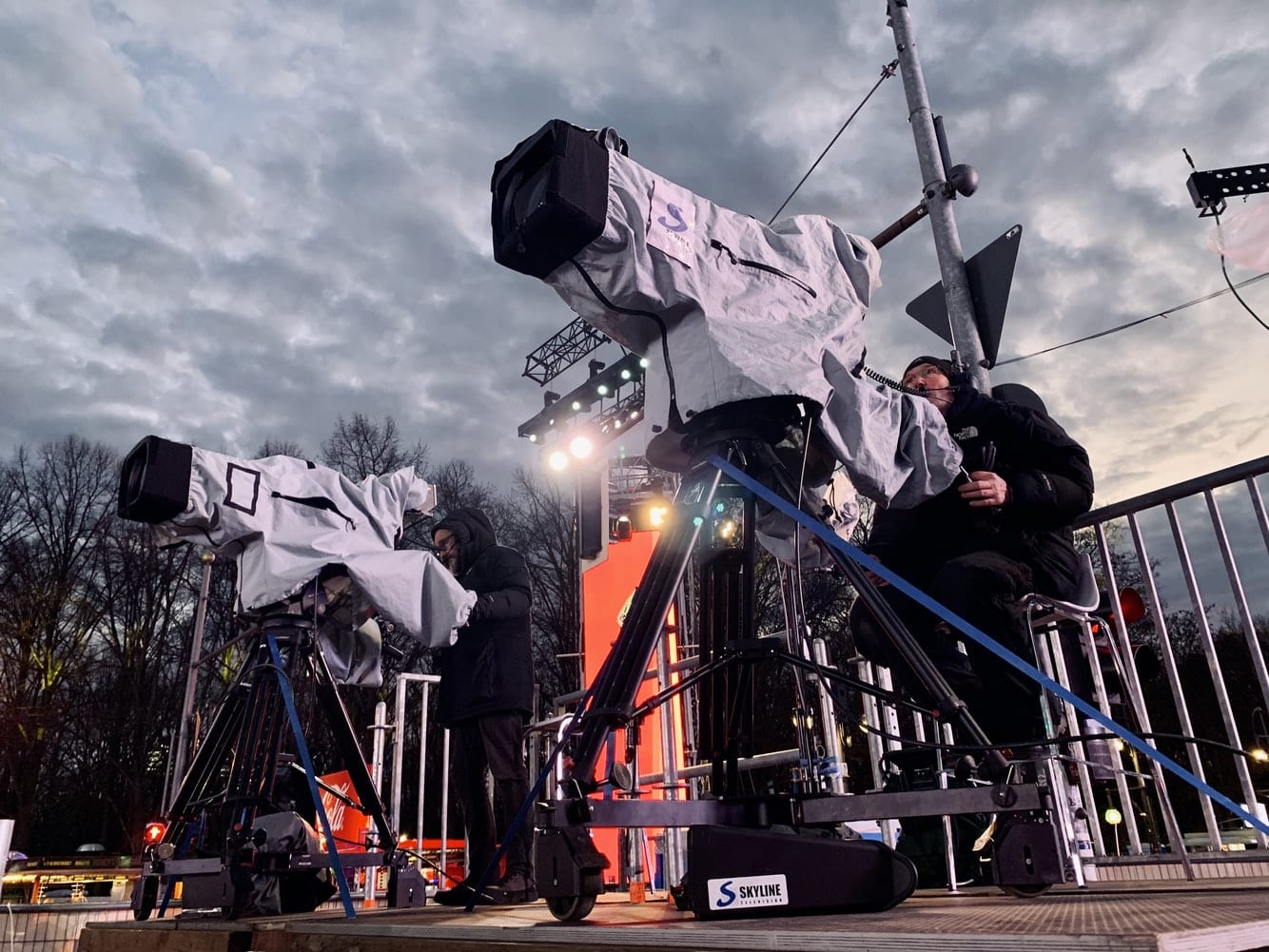Event production charlotte’s approach to multi-sensory experiences
Wiki Article
Just How Event Production Works: A Comprehensive Consider the Refine
Event production is a complicated and organized procedure that requires cautious preparation and execution. It begins with developing clear goals and recognizing the target market. Each step, from budgeting to place choice, plays a critical function in guaranteeing success. As the process unravels, various components must straighten seamlessly. The subtleties of this detailed procedure commonly go unnoticed. What are the key phases that add to an unforgettable event?
The Preliminary Drawing Board
When starting on event production, careful preparation is necessary to assure an effective outcome. The first drawing board acts as the structure for all subsequent efforts. During this phase, event producers should specify the event's function and purposes clearly. Determining the target market helps customize the experience and messaging, guaranteeing importance and engagement.Producers should likewise think about the event format, whether it be in-person, online, or crossbreed, as this will certainly influence various logistical aspects. Choosing an appropriate day and venue is vital, as it influences availability and availability.Furthermore, assembling a dependable group is basic for separating responsibilities and improving interaction. Establishing a timeline with turning points warranties all jobs are completed on time. This stage includes detailed study, consisting of identifying prospective obstacles and creating techniques to reduce risks. Ultimately, a well-structured first preparation phase establishes the tone for an effective event production trip.
Budgeting and Resource Allowance
In event production, effective budgeting and source appropriation are vital for success - event production charlotte. Establishing financial criteria sets the foundation for all succeeding choices, while resource distribution approaches assure that every element of the event is appropriately supported. With each other, these aspects assist keep control over expenditures and optimize the usage of readily available resourcesDeveloping Financial Parameters
Developing monetary parameters is vital to the success of any type of event production, as it establishes the foundation for effective budgeting and resource allowance. This procedure starts with defining the general spending plan, which includes all elements of the event, including location costs, wedding catering, and advertising. By recognizing available funds, event coordinators can prioritize expenses and allocate sources appropriately. Furthermore, it is important to conduct comprehensive market research study to prepare for prospective costs and recognize financing sources, such as sponsorships or ticket sales. Developing clear economic criteria additionally help in threat administration, allowing coordinators to set aside contingency funds for unexpected expenditures. Eventually, a distinct budget plan serves as a roadmap, leading the event production group in the direction of accomplishing their objectives while keeping financial control.Source Distribution Methods
Efficient resource distribution methods are important for taking full advantage of the influence of an occasion while adhering to budget plan restraints. Successful event production needs a meticulous method to budgeting and source allotment. Planners should prioritize crucial elements such as location, wedding catering, and innovation, making certain that funds are alloted to areas that enhance participant experience. A thorough budget must outline expected expenditures and identify locations for prospective cost financial savings, such as bargaining with vendors or checking out sponsorship possibilities. Additionally, tracking expenses throughout the preparation process aids avoid overspending. By using calculated resource distribution, event producers can deliver a memorable experience while keeping monetary obligation, eventually adding to the overall success of the event.Location Choice and Logistics
Selecting the appropriate venue is important to the success of any kind of event, as it establishes the stage for the general experience. Venue option includes reviewing various factors, including capacity, accessibility, and location. Organizers must consider the target audience and the nature of the event, ensuring the venue straightens with the event's goals.Logistics play a substantial duty in this procedure, involving setups for seating, audiovisual tools, and catering solutions. A well-chosen place should help with smooth flow for participants and staff, enhancing engagement.Additionally, reviewing potential places for services like parking, toilets, and emergency departures is necessary for safety and security and ease. The timeline for securing the location is likewise essential, as popular areas may reserve promptly - event production charlotte. Detailed planning and prompt execution can eventually contribute to a smooth event experience, making location option and logistics fundamental elements of successful event production.
Innovative Principle Advancement
While the place sets the physical stage, imaginative concept advancement shapes the event's identity and narrative. This procedure starts with identifying the event's function and target market, enabling event producers to create a compelling style that reverberates with attendees. Brainstorming sessions frequently include diverse viewpoints, cultivating cutting-edge ideas that straighten with the event's goals.Once a theme is developed, visual elements such as color schemes, signage, and decor are developed to enhance the general ambience. Storytelling methods may likewise be incorporated to produce an engaging trip for participants, guaranteeing an unforgettable experience. In addition, considerations pertaining to amusement, tasks, and interactive elements are lined up with the selected idea, strengthening the motif throughout the event.Ultimately, effective innovative idea development assurances that every aspect of the event functions cohesively, leaving an enduring perception on guests and fulfilling the event's objectives. This foundational job lays the foundation for succeeding preparation and execution phases.Collaborating With Suppliers and Distributors
Effective event production rests on effective partnership with suppliers and suppliers. Selecting trustworthy companions, bargaining agreements successfully, and making certain timely deliveries are essential action in this procedure. Each of these variables adds considerably to the total success and smooth execution of an event.Selecting Reliable Partners
Just how can event organizers assure a seamless production experience? Picking trustworthy companions is necessary in accomplishing this objective. Event planners must perform extensive study to identify suppliers and distributors with a tried and tested record of quality. This includes examining recommendations, reviewing portfolios, and assessing customer feedback. Organizers ought to focus on companions that demonstrate professionalism and trust, prompt interaction, and a determination to team up. Structure solid connections cultivates trust and enables quick analytical throughout the event. Additionally, it is beneficial to choose regional suppliers who understand the venue and regional logistics. Inevitably, a successful event pivots on the synergy between planners and their partners, making certain that every facet of production runs efficiently and effectively.Discussing Agreements Properly
Effective arrangement of contracts is an essential a fantastic read action in the cooperation in between event organizers and their vendors and suppliers. This process includes clear communication of assumptions, deliverables, and timelines. Organizers ought to perform extensive research study on market prices and industry requirements to develop a baseline for settlements. It is crucial to produce a collective ambience, motivating open dialogue about terms, pricing, and prospective contingencies. Planners should likewise prioritize comprehending the vendor's capabilities and restrictions to align their needs properly. Adaptability can result in mutually helpful arrangements, fostering lasting relationships. Crafting distinct agreements that include certain performance metrics can assist assure liability, ultimately leading to successful event implementation and complete satisfaction for all events included.Ensuring Timely Shipments
Prompt shipments are vital for the smooth implementation of any event, calling for diligent cooperation between planners and their suppliers and providers. Effective interaction is crucial, as it helps develop clear assumptions relating to shipment timetables, quantities, and details demands. Planners frequently create comprehensive timelines to outline vital turning points, making sure all events remain aligned throughout the process. Regular check-ins with vendors can assist determine possible delays early, permitting for proactive remedies. Additionally, building strong relationships with trustworthy suppliers promotes depend on and accountability, which can result in much better service and prioritization. By focusing on these collaborative initiatives, planners can decrease interruptions, therefore boosting the total performance of event production and making sure that all required materials and solutions show up as planned.Advertising and Promo Methods
While arranging an event, the success of advertising and marketing and promo approaches can significantly affect participation and interaction. Effective techniques typically include a combination of electronic advertising, standard marketing, and grassroots outreach. Using social media sites systems enables real-time communication and targeted marketing, getting to particular demographics properly. Email marketing projects can better involve potential guests with customized web content and reminders.Collaborations with influencers or industry leaders can also improve reliability and broaden reach. Developing appealing content, such as video clips or blogs, assists to create buzz and suffer passion leading up to the event. Furthermore, leveraging early-bird discounts and special benefits can incentivize ticket purchases.Promoting with conventional networks, such as posters or neighborhood media, continues to be pertinent, specifically in community-focused events. A thorough approach that integrates multiple approaches assurances maximum presence and interaction, ultimately adding to the event's success and the creation of an unforgettable experience for guests.
On-Site Execution and Monitoring
On-site implementation and management are vital elements that identify the overall success of an occasion. Efficient sychronisation during the event ensures that all elements align with the planned program. Event managers manage logistics, consisting of supplier sychronisation, tools configuration, and visitor services. Monitoring timelines and attending to any unforeseen problems are essential for preserving a seamless experience.The additional reading personnel plays a considerable duty, as trained personnel are accountable for numerous tasks such as registration, info circulation, and technical support. Interaction among staff member is important; it cultivates a joint atmosphere and enables fast resolution of challenges.Additionally, safety and security protocols have to be stuck to, protecting the well-being of all participants. Post-event examinations are likewise component of on-site management, offering understandings for future enhancements. By concentrating on these aspects, event manufacturers can produce remarkable experiences that satisfy or exceed participant expectations while accomplishing the event's objectives.Frequently Asked Concerns
Just how Do I Pick the Right Event Theme?
Choosing the appropriate event style includes taking into consideration the target market, event purpose, and venue. Looking into current patterns and gathering input from stakeholders can likewise inspire creative ideas that resonate and create a remarkable experience.
What Are Typical Errors in Event Production?
Typical errors in event production often include insufficient preparation, inadequate communication among group participants, budget mismanagement, disregarding to consider the target market's requirements, and failing to carry out a thorough post-event examination for future enhancements.Exactly How Can I Gauge Event Success?
To determine event success, one can assess guest satisfaction, engagement levels, budget plan adherence, and post-event comments. Key efficiency signs, such as ticket sales and social media sites communications, additionally give valuable insights into general performance.What Should I Do if It Rains on the Event Day?
In the event of moisten the day, the organizer must carry out contingency plans, such as protecting camping tents or relocating activities inside. Interaction with participants about adjustments is important to ensure a smooth experience regardless of climate obstacles.Just How Can I Make Certain Participant Involvement During the Event?

Report this wiki page